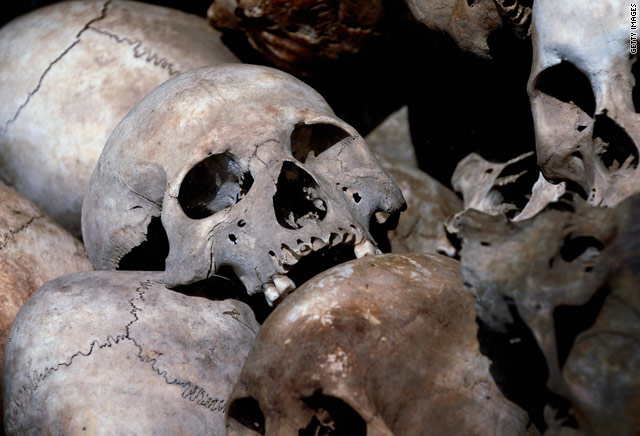
Phnom Penh, Cambodia (CNN) -- A man who ran a notorious Cambodian torture prison where more than 14,000 people died during the Khmer Rouge regime was found guilty of war crimes Monday and sentenced to 35 years in prison.
Despite the sentence, Kaing Guek Eav, alias Duch, will serve no more than 19 years. The judge took off five years for the time Duch was illegally detained before the United Nations-backed tribunal was established, and another 11 years for the time he has already served behind bars.
The verdict -- which also convicted Duch of crimes against humanity, murder and torture -- sparked strong reactions as word spread outside the courtroom. Some said it made them lose faith in the war crimes tribunal.
"It's becoming a sham," said Cambodian-American Theary Seng, chairwoman of the Center for Justice and Reconciliation.
Seng, who said the Khmer Rouge killed both of her parents, described Monday's verdict as "scandalous."
"It's an insult to the survivors. Effectively, he should have been receiving many life sentences. It makes light of the crime and suffering," she said.
Duch, 67, was the head of the S-21 prison. Few people brought to the prison made it out alive; only about a dozen were found by the Vietnamese, who invaded Cambodia in 1979.
One of the survivors, Bou Meng, said that the verdict made him so angry that he was sweating in the air-conditioned courtroom as he listened to the judge's words.
"I underwent brutal torture. Although Duch did not hit me himself, he ordered his men to hit me in front of him. This hurt me. The verdict seems to slap me in the face and kick me in the head," he said.
Prosecutors had asked for a 40-year sentence. On Monday they said they were studying the ruling to decide whether to appeal. Duch's attorney, Kar Savuth, could not be reached for comment.
The judge, in announcing Duch's sentence, said he took into consideration that the defendant had expressed remorse, admitted responsibility and cooperated with the court. The judge also took into account the "coercive environment" of the Khmer Rouge, he said
Duch pleaded guilty, but said he was only following orders and asked for forgiveness. Last November, he asked to be freed after spending some 11 years in detention.
In the last week of the trial, he argued that international law did not apply to him because he was following orders.
When the verdict was read, spectators in the packed courtroom turned to each other and discussed in hushed tones the significance of the sentence.
"Thirty-five years. You can't return the lives of the people that were lost. But it's a start," said Collin Sam, 22, a Cambodian-American from Long Beach, California, who lost all her family members on her father's side during the regime.
Outside the courtroom, hundreds of Cambodians gathered for the verdict and millions more watched as it was televised live.
"Today is a historic, important day for the people of Cambodia," said Reach Sambath, the spokesman for the court.
The tribunal began its work in 2007 after a decade of on-and-off negotiations between the United Nations and Cambodia over the structure and functioning of the court. Monday's verdict was the court's first.
Ing Chheng, 71, who had five brothers killed by the Khmer Rouge, said he wanted to throw a stone at Duch when he saw him in court.
"I have been suffering for years," he said, noting that Monday's verdict "releases some suffering, but all will be released when the second case [against senior Khmer Rouge leaders] begins."
At least 1.7 million people -- nearly a quarter of Cambodia's population -- died under the 1975-1979 Khmer Rouge regime from execution, disease, starvation and overwork, according to the Documentation Center of Cambodia.
Another four of the ultra-Maoist regime's former leaders are waiting to see if they will stand trial before the U.N.-backed tribunal for war crimes and crimes against humanity.
Youk Chhang, director of the documentation center, said the verdict may not suit everyone, but said it was clear that Duch "will never be a free man again."
He said he thought Cambodians would be able to turn over a new leaf.
"This is what we have, and then we must move [on]. We have our own identity now, our own family, our own society now. We have to build it, make it strong, to prevent [the past] from happening" again, he said.

No comments:
Post a Comment